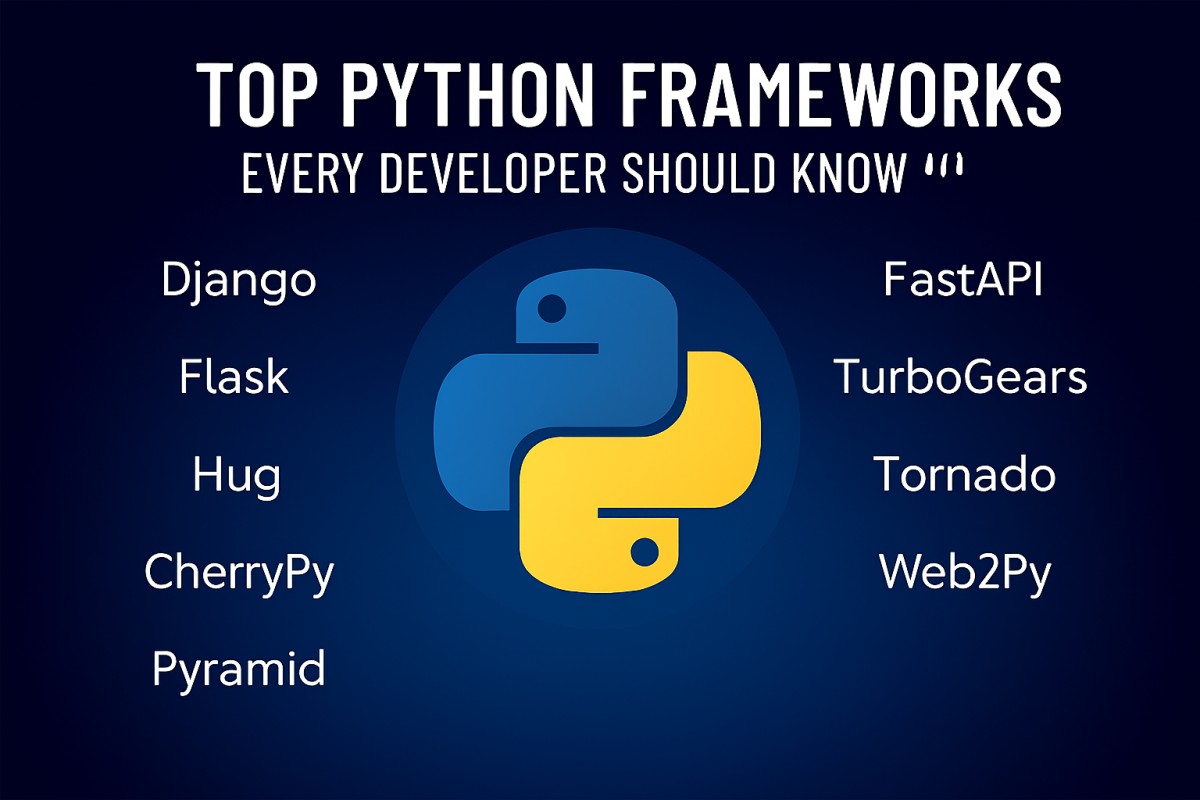Top Python Frameworks Every Developer Should Know

Python has become one of the most popular programming languages in the world. Its straightforward syntax, versatility, and wide range of applications – from web development to data science and automation – have made it a go-to choice for developers. There are various reasons why developers prefer Python. One of the key factors is its ability to strike a balance between ease of use and powerful functionality. Whether you’re a beginner or an experienced developer, Python provides the right tools for fast development and scalability.
1. Django: The High-Level Web Framework
Django is one of the most widely used Python frameworks for web development. It was designed to help developers create robust web applications quickly, without having to worry about repetitive tasks like handling security, database interactions, or URL routing.
Django provides an easy-to-use ORM (Object-Relational Mapper) that allows developers to work with databases in a Pythonic way, and its built-in admin interface makes content management easier. With Django’s built-in features like authentication, form handling, and URL routing, developers can focus on building unique features for their application rather than reinventing the wheel.
Key Features:
- Fully integrated web framework
- Built-in admin interface
- Strong security features (e.g., protection against SQL injection, cross-site scripting)
- Scalable and suitable for large applications
- Excellent community support
Use Cases:
Django is ideal for building complex, data-driven websites like social media platforms, news sites, e-commerce platforms, and content management systems.
2. Flask: The Micro-Framework for Simplicity and Flexibility
Flask is another highly popular Python web framework, but unlike Django, it is considered a micro-framework. This means that Flask provides the basic tools to build a web application but leaves much of the development work to the developer. It’s lightweight, flexible, and gives developers full control over how they structure their applications.
Flask is a great choice for developers who want more freedom to build applications with specific requirements. It doesn’t come with built-in features like Django, so developers can pick and choose their tools and libraries.
Flask’s flexibility, combined with its large ecosystem of extensions, allows developers to easily add features like form validation, user authentication, or database support as needed.
Key Features:
- Lightweight and minimalistic
- Extensible with third-party libraries
- Simple and flexible routing
- Easy to learn and get started
- Great documentation and large community
Use Cases:
Flask is perfect for building smaller applications, APIs, and microservices. It’s also a great choice for developers who prefer to create custom solutions and need more control over their application.
3. FastAPI: For Building Fast APIs
FastAPI is a modern Python web framework designed specifically for building APIs. As the name suggests, it focuses on speed—both in terms of development and performance. FastAPI is built on top of Starlette for the web parts and Pydantic for data validation, making it one of the fastest web frameworks for Python.
FastAPI is often considered a great option for building highly performant REST APIs and services. It is also an excellent choice for projects that require asynchronous programming and real-time features, as it supports asynchronous requests out of the box.
FastAPI automatically generates documentation (with Swagger UI) for your API, making it incredibly easy for developers to interact with and test endpoints. It also integrates seamlessly with modern Python tools and libraries, such as Pydantic for data validation.
Key Features:
- Asynchronous programming support (async/await)
- Fast API creation with automatic documentation
- High performance (comparable to Go and Node.js)
- Easy integration with other Python libraries
- Automatic data validation with Pydantic
Use Cases:
FastAPI is ideal for building high-performance APIs and microservices, particularly in data-intensive applications, machine learning models, and real-time systems.
4. Pyramid: For Large-Scale Applications
Pyramid is a versatile and highly flexible Python framework that allows developers to build both small and large applications. It is known for its scalability, robustness, and ease of use. Pyramid provides the freedom to use any database, URL structure, and templating engine, allowing developers to create custom solutions for their projects.
Pyramid is a good choice for developers working on complex projects where they need flexibility without sacrificing features. It offers a good balance between the full-stack features of Django and the simplicity of Flask.
Key Features:
- Flexible and scalable
- Supports various templating engines and databases
- Built-in security features
- Great for both small and large applications
- Good documentation and strong community support
Use Cases:
Pyramid is ideal for building both small applications and large, enterprise-level projects. It’s particularly well-suited for projects that require custom architecture or those that need to scale efficiently.
5. Tornado: For Real-Time Web Applications
Tornado is a Python web framework and asynchronous networking library designed to handle large numbers of simultaneous connections. It’s particularly useful for building real-time web applications like chat apps, live updates, or applications that require long-lived connections.
Unlike traditional synchronous frameworks like Django and Flask, Tornado allows developers to handle multiple connections simultaneously, making it an excellent choice for applications that need to support WebSockets and long-polling.
Tornado’s ability to handle high loads with low latency makes it perfect for real-time applications that require seamless communication.
Key Features:
- Asynchronous networking and non-blocking I/O
- Excellent for real-time web apps
- Supports WebSockets and long-polling
- High performance and scalability
- Low memory usage and efficient handling of many simultaneous connections
Use Cases:
Tornado is best suited for building real-time applications, such as chat systems, live streaming platforms, online gaming, and any application that needs to handle a large number of concurrent users or long-lived connections.
6. CherryPy: An Object-Oriented Framework for Web Applications
CherryPy is one of the oldest Python web frameworks and provides a minimalist and object-oriented approach to web development. It focuses on simplicity and flexibility, allowing developers to build web applications with minimal boilerplate code.
CherryPy is ideal for developers who prefer an object-oriented design and want to build web applications with a small footprint.
Key Features:
- Object-oriented design
- Minimalistic with an easy-to-use interface
- Works with any WSGI-compatible server
- Built-in multi-threading
- Supports session handling and cookies
Use Cases:
CherryPy is best suited for small to medium-sized web applications and services, particularly for developers who prefer object-oriented programming and a minimalistic approach.
7. Bottle: A Lightweight Framework for Simple Apps
Bottle is another lightweight Python framework that is perfect for small applications. It’s a micro-framework that provides the essentials needed to build a simple web application, including routing, templating, and support fthe or W protocolSGI.
Bottle is highly portable and easy to use, making it a great option for prototyping, single-page applications, or microservices.
Key Features:
- Single-file application
- Simple and easy to use
- Integrated templating engine
- Supports routing and request handling
- Very lightweight and fast
Use Cases:
Bottle is ideal for building small, single-page applications, REST APIs, or as a starting point for testing and prototyping.
Bottom Line
Python is a versatile language, and with its broad range of frameworks, developers can choose the one that best fits their project needs. Whether you’re building a robust, data-driven website with Django, a high-performance API with FastAPI, or a real-time application with Tornado, Python has you covered.
By choosing the right framework for your project, you can ensure both rapid development and high-quality results. With the wide array of frameworks available, Python continues to be the preferred choice for developers building scalable and efficient applications.



